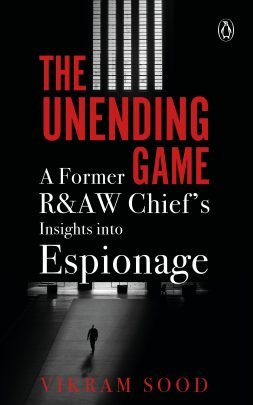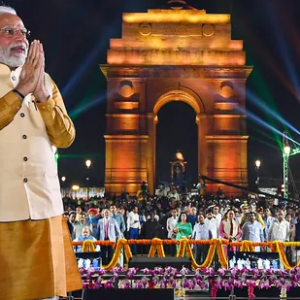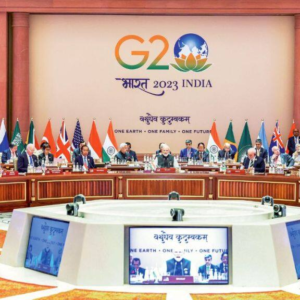Author: Vikram Sood
Publisher: Penguin Viking, 2018, pp 304
Price: Rs.599/-
Book Review by:Abhishek Pratap Singh
The Unending Game: A Former R&AW Chief’s Insights into Espionage’ is an enduring account of India’s intelligence framework citing global spy operations and a meticulous contribution to scholarship. As the author himself notes, there is a certain ‘prevalent perception’ about the world of intelligence, given the world of fiction built around the subject, and to uncomplicate the same, the present book by former Research and Analysis Wing Chief, Vikram Sood, forms an intelligent, detailed and insightful account about the functioning and operation of intelligence system in India. As the title suggests, it basically builds on the functioning of the intelligence system in the past and its key significance in contemporary times, also identifying the challenges involved with it as we look towards its role for future. Interestingly, it also notes the role of ‘sharpened intelligence’ as a major component with India stressing out for its new role in international affairs and changing geo-politics around.
The book also covers the memoirs of India’s intelligence operations by the author and goes in detail about the collection of information systems, related facts and its further interpretation with a bit of sensation. The book includes eleven chapters that go through three different but interrelated themes such as statecraft, inside intelligence network and the future ahead.
In the very first part of the book, Sood has eloquently discussed and explained the importance of intelligence by identifying it as ‘foremost duties of any government.’ The author also goes on to discuss in detail the functioning and work of a spy in a more realistic manner, identifying major qualities of the job and challenges involved with intelligence in the age of communication revolution that requires expertise in language and with the issue, also noting the new and widening ambit of security and its meaning.
While noting the vulnerabilities of cyber technology, the author identifies the significance of covert operations given India’s relations with China and Pakistan, reflecting his simmering concerns with India’s two uneasy neighbours. By taking inferences from the memoirs of George Tenet, the CIA Director at the time of 9/11, the author reiterates the cost attached with the ignorance of intelligence and limitations of ‘could have been’ school of thought in part one, also later pointing to the thinness of US intelligence in covering the threat of Islamic terror.
The author puts the grey shade of intelligence by quoting General Dwight Eisenhower who referred to it as ‘a distasteful but vital necessity’. While discussing about the intelligence system in Pakistan, primarily led by ISI, in the chapter on “The Asian Paying Fields”, he notes its key role in ‘managing two frontiers’ and being the significant ‘parallel powerful army’ within their political system. He underlines the ideological and structural difference between both the countries, given their differential intelligence configuration and operations.
While discussing about the CIA-KGB battles, Sood outlines how the KGB was able to outsmart western intelligence services, but has to face setbacks when Soviet leaders ignored the importance of intelligence. Much to the dismay of many, the chapter titled “State of Surveillance”, points to the short moment of glory by making intelligence public and the cost attached with it.
The chapter titled ‘Intelligence Smoke and Mirrors’ takes us to the darkness of espionage world, giving insights into the formation of ‘secret societies’ given ‘paramount fear’ amongst rich elite and the birth of intelligence privatisation, at the full display in Cold War years. The reading here well captures the grey shade of intelligence in order to protect business interest of few.
If Kargil was a case of intelligence failure for India, the author details the reports by IB and RAW between May 1998 to April 1999 warning the same but to the lesser notice by the then army. The preference for strategic alliances over cultural links goes well with the realist framework, and remains a dominant practice in post cold war era politics, which is well argued in the book.
On the subject of ‘intelligence reforms,’ the book attaches greater significance to the role and command over advanced technology and innovative functioning with the application of same, keeping in mind our objectives, ability of adversaries and friends. Intelligence reforms must well be formulated “having determined our goals and obstacles”, keeping in mind non-conventional challenges to the state. One has to design newer methods of defence and offence both in the age of technology war, given overflow of information and sharing, given effective networking amongst terrorist organisations. Noting the shift in the age of information, the author attaches greater significance to the role of human intelligence (HUMINT) and expert training in terms of analysts, operators, handlers and master spies, also emplacing the importance of intuition born out of sustained experience.
The book culminates with the future challenges involved in the domain of national security and intelligence, and lists out some key intelligence reforms that India must look upon to make the job efficient, competent, professional and above all relevant in the present global order that is marred by turbulence and uncertainty. The book emphasises the importance of avoiding a ‘revolving door’ culture in the Indian intelligence network at the cost of service professionalism and integrity.
From the beginning to the end, the book takes it readers through a range of issues involving intelligence system starting from training to espionage, private intelligence to cold war fears, geopolitics to post war fault lines, secret societies to overt measures, conventional intelligence to cyber espionage, oil crisis to water threats, and from reform to challenges involved with intelligence in the age of technology and innovation.
The book forms a useful addition to the books on the subject and would be greatly useful to all those who would like to have insights into the functioning of intelligence agencies.
(Mr. Abhishek Pratap Singh holds PhD in East Asian Studies (Chinese) from
Jawaharlal Nehru University (JNU), New Delhi and teaches at University of Delhi.)
(This Book Review is carried in the print edition of January-February 2019 issue of India Foundation Journal.)




